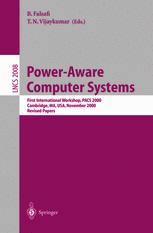

Most ebook files are in PDF format, so you can easily read them using various software such as Foxit Reader or directly on the Google Chrome browser.
Some ebook files are released by publishers in other formats such as .awz, .mobi, .epub, .fb2, etc. You may need to install specific software to read these formats on mobile/PC, such as Calibre.
Please read the tutorial at this link: https://ebookbell.com/faq
We offer FREE conversion to the popular formats you request; however, this may take some time. Therefore, right after payment, please email us, and we will try to provide the service as quickly as possible.
For some exceptional file formats or broken links (if any), please refrain from opening any disputes. Instead, email us first, and we will try to assist within a maximum of 6 hours.
EbookBell Team

4.7
16 reviewsThe phenomenal increases in computer system performance in recent years have been accompanied by a commensurate increase in power and energy dissipation. The latter has directly resulted in demand for expensive packaging and cooling technology, an increase in product cost, and a decrease in product reliability in all segments of the computing market. Moreover, the higher power/energy dissipation has signi cantly reduced battery life in portable systems. While - stem designers have traditionally relied on circuit-level techniques to reduce - wer/energy, there is a growing need to address power/energy dissipation at all levels of the computer system. We are pleased to welcome you to the proceedings of the Power-Aware C- puter Systems (PACS 2000) workshop. PACS 2000 was the rst workshop in its series and its aim was to bring together experts from academia and industry to address power-/energy-awareness at all levels of computer systems. In these p- ceedings, we bring you several excellent research contributions spanning a wide spectrum of areas in power-aware systems, from application all the way to c- pilers and microarchitecture, and to power/performance estimating models and tools. We have grouped the contributions into the following speci c categories: (1) power-aware microarchitectural/circuit techniques, (2) application/compiler power optimizations, (3) exploiting opportunity for power optimization in - struction scheduling and cache memories, and (4) power/performance models and tools.